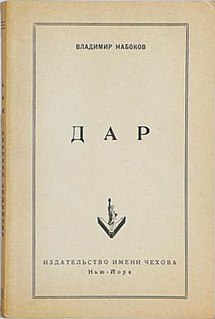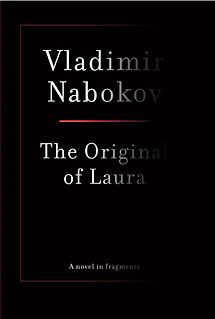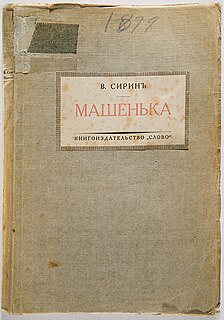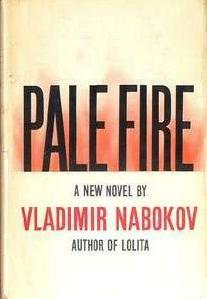On First Looking into Chapman's Homer is a sonnet written by the English Romantic poet John Keats (1795–1821) in October 1816. It tells of the author's astonishment while reading the works of the ancient Greek poet Homer as freely translated by the Elizabethan playwright George Chapman.
Postmodern literature is literature characterized by reliance on narrative techniques such as fragmentation, paradox, and the unreliable narrator; and is often defined as a style or a trend which emerged in the post–World War II era. Postmodern works are seen as a response against dogmatic following of Enlightenment thinking and Modernist approaches to literature.

Boris Nikolaevich Bugaev, better known by the pen name Andrei Bely or Biely, was a Russian novelist, poet, theorist, communist, and literary critic. His novel Petersburg was regarded by Vladimir Nabokov as one of the four greatest novels of the 20th century.

The Gift is Vladimir Nabokov's final Russian novel, and is considered to be his farewell to the world he was leaving behind. Nabokov wrote it between 1935 and 1937 while living in Berlin, and it was published in serial form under his nom de plume, Vladimir Sirin.

The Original of Laura is an incomplete novel by Vladimir Nabokov, which he was writing at the time of his death in 1977. It was finally published, after 30 years of private debate, on November 17, 2009. Nabokov had requested that the work be destroyed upon his death, but his family hesitated to carry out his wish to destroy an incomplete but perhaps important literary work. Over the next years its contents were viewed only by Nabokov's son, wife, and a few scholars.
Brian Boyd is a professor of literature known primarily as an expert on the life and works of author Vladimir Nabokov and on literature and evolution. He is a University Distinguished Professor in the Department of English at the University of Auckland, New Zealand.
John Hawkes, born John Clendennin Talbot Burne Hawkes, Jr., was a postmodern American novelist, known for the intensity of his work, which suspended some traditional constraints of narrative fiction.

Mary, is the debut novel by Vladimir Nabokov, first published under pen name V. Sirin in 1926 by Russian-language publisher "Slovo".
A verse novel is a type of narrative poetry in which a novel-length narrative is told through the medium of poetry rather than prose. Either simple or complex stanzaic verse-forms may be used, but there will usually be a large cast, multiple voices, dialogue, narration, description, and action in a novelistic manner.

Invitation to a Beheading is a novel by Russian American author Vladimir Nabokov. It was originally published in Russian from 1935 to 1936 as a serial in Contemporary Notes, a Russian émigré magazine. In 1938, the work was published in Paris, with an English translation following in 1959. The novel was translated into English by Nabokov's son, Dmitri Nabokov, under the author's supervision.

The Eye, written in 1930, is Vladimir Nabokov's fourth novel. It was translated into English by the author's son Dmitri Nabokov in 1965.

Look at the Harlequins! is a novel written by Vladimir Nabokov, first published in 1974. The work was Nabokov's final published novel before his death in 1977.

King, Queen, Knave is a novel written by Vladimir Nabokov, while living in Berlin and sojourning at resorts in the Baltic in 1928. It was published as Король, дама, валет in Russian in October of that year; the novel was translated into English by the author's son Dmitri Nabokov in 1968, forty years after its Russian debut.
Edsel Ford was a poet who lived most of his life in Arkansas. He had the same name as Henry Ford's son.

The Ambidextrous Universe is a popular science book by Martin Gardner, covering aspects of symmetry and asymmetry in human culture, science and the wider universe.
Striking and Picturesque Delineations of the Grand, Beautiful, Wonderful, and Interesting Scenery Around Loch-Earn, also published as A Description of the Beauties of Edinample and Lochearnhead, is a short book by the Scotsman Angus McDiarmid (1770?–1820?) that led the local-history populariser Archie McKerracher to call him "the world's worst author".

Lolita is a 1955 novel written by Russian-American novelist Vladimir Nabokov. Many authors consider it the greatest work of the 20th century, and it has been included in several lists of best books, such as Time's List of the 100 Best Novels, Le Monde's 100 Books of the Century, Bokklubben World Library, Modern Library's 100 Best Novels, and The Big Read. The novel is notable for its controversial subject: the protagonist and unreliable narrator, a middle-aged literature professor under the pseudonym Humbert Humbert, is obsessed with a 12-year-old girl, Dolores Haze, with whom he becomes sexually involved after he becomes her stepfather. "Lolita" is his private nickname for Dolores. The novel was originally written in English and first published in Paris in 1955 by Olympia Press. Later it was translated into Russian by Nabokov himself and published in New York City in 1967 by Phaedra Publishers.
















